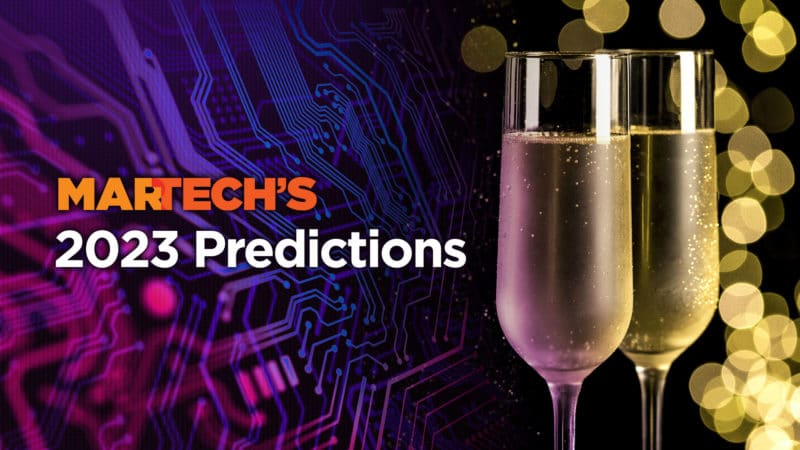
Data is at the center of what marketers do, and this will be a prime focus for marketers in 2023. Changes like Google’s delayed third-party cookie wind down, and new legislation in states like Virginia, will put extra pressure on organizations in the coming year. They’ll need to make the most of the first-party data they have, while finding ways to supplement it or simply get more.
In the new year, many of the priorities remain the same, but the stakes are even higher. Here are some ways data will change marketing in 2023.
Building trust and owning datasets
Building trust with consumers will become even more important.
“The loss of third-party data means an increased value in first-party data, which requires organizations to build trust within their community of users and data owners,” said Prateek Kapadia, CTO of marketing AI company Flytxt. “The only way organizations can authentically gain that trust is through providing transparency and control to the use of data, which will be a vital goal for 2023.”
“Post iOS, all brands are waking up to the fact that owning their customer datasets is critical to assess what’s working in the marketing mix,” said Jake Cook, President and co-founder of ecommerce marketing platform Tadpull. “Meta can’t tell you. Shopify can’t tell you. Google can’t tell you. It’s too splintered and there is no source of truth. So, it’s falling back on companies to figure all this out on their own and be able to deploy marketing capital in smart ways by knowing what’s working from their data.”
Dig deeper: The new identity landscape
New signals from remixable content
Marketers are playing catch-up when it comes to mobile users. Apple’s phase out of mobile identifiers (IDFA) restricts the device data that can help advertisers deliver customized ads. Increasingly, marketers will depend on widely-shared and remixable content on social platforms to fill some of these gaps.
“‘Remixable’ content powered by in-platform features across TikTok, Instagram, and YouTube Shorts will drive scale and distribution of user generated content,” said Ryan Detert, CEO of influencer marketing company Influential. “If leveraged properly, social content will also unlock new signals that can be leveraged in a post-IDFA world.”
Intelligent web page design and email campaigns
Marketers and publishers will look to tweak web page designs and log-in based environments “to access valued and relevant content based on understanding of the user’s profile and preferences,” said Matt Yorke, CRO of B2B media and technology company Foundry.
They’ll also use intelligent email campaigns that suggest recommended additional related content pieces to audiences, and AI that captures data from the first letter typed and not just upon form submission, Yorke said.
He added, “AI is also used to understand a user’s web behavior and learn from the way they behave in order to capture their data.”
New AI-powered scoring frameworks
B2B marketers will draw on AI to crunch the data at scale to score multiple signals from multiple buyers.
“Artificial intelligence will need to be leveraged to move past our current framework of scoring one-dimensional actions and to instead offer insights that analyze multiple signals from multiple buyers in many different settings, as well as the quality of digital engagement taking place within an account,” said Foundry’s CMO Brian Stoller.
He added, “Metrics like clicks and downloads are independent actions that only offer one-dimensional insight. Marketers need to examine and understand how people are experiencing, engaging with, and reacting to content. Metrics here might include: time spent on page, pages viewed, active sessions (scrolling through content), click paths, multiple assets viewed and engaged with, multiple stakeholders from a buying group engaging.”
More fines for noncompliance
In 2022, Sephora agreed to pay $1.2 million in fines, in the first public enforcement of CCPA. Already in 2023, GDPR has hit Meta with much much more.
“We can expect to see more of these cases in the coming year,” said Hugo Loriot, partner at technology consultancy 55. “While there is confusion around growing compliance regulations in the U.S. – especially with legislators still working to pass a federal privacy legislation, most recently, the American Data Privacy and Protection Act (ADPPA), that will provide a single, national foundation for data privacy – GDPR will be the gold standard for brands to follow in the near term. The ‘grace period’ for privacy compliance is closing, and both global and U.S. brands have to ensure their compliance standards are up to par if they don’t want to be taken to court.”
Deeper data insights from AI, and more humane marketing work
“As data capabilities and approaches improve through the use of synthetic data and foundational models, algorithms will evolve to deliver deeper insights, enabling marketers to understand customer needs and meet business goals faster,” said Vipul Vyas, SVP of vertical strategy at marketing AI company Persado.
When AI joins the workflow in the form of analytics or generative AI, marketing team members could see work become more humane.
“Humans possess traits that AI does not: the creativity to adapt to unexpected customer needs; cross-domain expertise to tap different knowledge centers to solve a problem; and empathy and authenticity that is essential for mutual understanding,” said Mathilde Collin, CEO and co-founder of customer communications platform Front. “Far from the AI-driven dystopia some expect, this world is one where customer experiences will be even more personalized and more white-glove. Workers will find this more humane, too, because they will have more flexibility — whether it’s location, work hours, or how their creativity, expertise and empathy can be applied, well beyond what their resume may have previously locked them into.”
More sociological data
Even with data getting more scarce, the demand from customers will grow for them to be better understood by marketers.
“It’s about understanding them and their values,” said Isabelle Guis, CMO at data management software company Commvault. “In 2023, Marketers also need to be sociologists to understand the cultural and political implications of what you may say or what it means if you say nothing. In essence, their ‘people preferences.’”
She added, “As you know, what was once a relatively innocuous tweet, can now be perceived as a political statement. Even the platform itself is in question — as customers may be using it less, or may think differently for you if you do (or don’t) use it. With events, do you require masks or vaccinations? As marketers, we need to be sure we’re seen through a business and social lens.”
Non-addressable campaigns on the rise
Advertisers will look at more sophisticated non-addressable campaigns to replace addressable targeting that depends on IDs.
“Today, 30% of ad opportunities don’t have advertising IDs attached,” said Yahoo’s CRO, Elizabeth Herbst-Brady. “By 2024, that figure is expected to be more than 75%. The need is clearer than ever to embrace solutions, such as machine learning-powered contextual targeting and other sophisticated tactics, that allow advertisers to reach audiences at scale without using IDs.”
She added, “Further, in an uncertain economic environment, embracing non-addressable enables advertisers to realize cost efficiencies, as non-addressable supply is less expensive than addressable. Addressing the non-addressable will be an omnichannel challenge, not limited to the web.”
Get MarTech! Daily. Free. In your inbox.




